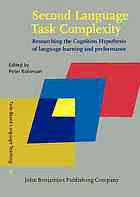Table Of ContentSecond Language Task Complexity
Task-Based Language Teaching:
Issues, Research and Practice (TBLT)
Task-Based Language Teaching (TBLT) is an educational framework for
the theory and practice of teaching second or foreign languages. The TBLT
book series is devoted to the dissemination of TBLT issues and practices,
and to fostering improved understanding and communication across the
various clines of TBLT work.
For an overview of all books published in this series, please see
http://benjamins.com/catalog/tblt
Editors
Martin Bygate John M. Norris Kris Van den Branden
University of Lancaster University of Hawaii at Manoa KU Leuven
Volume 2
Second Language Task Complexity. Researching the Cognition Hypothesis
of language learning and performance
Edited by Peter Robinson
Second Language Task Complexity
Researching the Cognition Hypothesis
of language learning and performance
Edited by
Peter Robinson
Aoyama Gakuin University
John Benjamins Publishing Company
Amsterdam / Philadelphia
TM The paper used in this publication meets the minimum requirements of
8
American National Standard for Information Sciences – Permanence of
Paper for Printed Library Materials, ansi z39.48-1984.
Library of Congress Cataloging-in-Publication Data
Second language task complexity : researching the cognition hypothesis of language learn-
ing and performance / edited by Peter Robinson.
p. cm. (Task-Based Language Teaching, issn 1877-346X ; v. 2)
Includes bibliographical references and index.
1. Second language acquisition. 2. Language and languages--Study and teaching. I.
Robinson, Peter.
P118.2.S44 2011
401’.93--dc23 2011022620
isbn 978 90 272 0719 7 (Hb ; alk. paper)
isbn 978 90 272 0720 3 (Pb ; alk. paper)
isbn 978 90 272 9027 4 (Eb)
© 2011 – John Benjamins B.V.
No part of this book may be reproduced in any form, by print, photoprint, microfilm, or any
other means, without written permission from the publisher.
John Benjamins Publishing Co. · P.O. Box 36224 · 1020 me Amsterdam · The Netherlands
John Benjamins North America · P.O. Box 27519 · Philadelphia pa 19118-0519 · usa
Table of contents
List of contributors vii
Acknowledgements ix
Series editors’ preface to Volume 2 xi
part 1. Cognition, task complexity, language learning,
and performance – theoretical and methodological issues
Chapter 1. Second language task complexity, the Cognition
Hypothesis, language learning, and performance 3
Peter Robinson
Chapter 2. Speech production and the Cognition Hypothesis 39
Judit Kormos
Chapter 3. Corpus-driven methods for assessing accuracy in learner production 61
Stefanie Wulff and Stefan Th. Gries
part 2. Researching the effects of task complexity across task types
and modes of L2 performance
Chapter 4. Task complexity and linguistic performance in L2 writing
and speaking: The effect of mode 91
Folkert Kuiken and Ineke Vedder
Chapter 5. Manipulating task complexity across task types and modes 105
Roger Gilabert, Julia Barón and Mayya Levkina
part 3. Researching the effects of task complexity on L2 interaction,
modified output, and uptake
Chapter 6. Effects of task complexity and interaction on L2 performance 141
Marije C. Michel
Chapter 7. Task complexity, modified output, and L2 development
in learner-learner interaction 175
Ana-María Nuevo, Rebecca Adams and Lauren Ross-Feldman
Chapter 8. Task complexity, uptake of recasts, and L2 development 203
Andrea Révész, Rebecca Sachs and Alison Mackey
Second Language Task Complexity
part 4. Researching the influence of learner characteristics and perceptions
on simple and complex L2 task performance
Chapter 9. When individual differences come into play: The effect
of learner creativity on simple and complex task performance 239
Ágnes Albert
Chapter 10. Working memory capacity and narrative task performance 267
Judit Kormos and Anna Trebits
Chapter 11. Task complexity, language anxiety, and the development
of the simple past 287
YouJin Kim and Nicole Tracy-Ventura
Chapter 12. Examining the influence of intentional reasoning demands
on learner perceptions of task difficulty and L2 monologic speech 307
Tomohito Ishikawa
Author index 331
Subject index 337
List of contributors
Rebecca Adams Marije C. Michel
University of Auckland University of Mannheim
New Zealand Germany
Agnes Albert Ana-Maria Nuevo
Eötvös Loránd University American University
Hungary USA
Julia Barón Andrea Révész
University of Barcelona Lancaster University
Spain UK
Roger Gilabert Peter Robinson
University of Barcelona Aoyama Gakuin University
Spain Japan
Stefan Th. Gries Lauren Ross-Feldman
University of California Georgetown University
Santa Barbara, USA USA
Tomohito Ishikawa Rebecca Sachs
Soka Gakuin University Georgetown University
Japan USA
YouJin Kim Nicole Tracy-Ventura
Georgia State University University of Southampton
USA UK
Judit Kormos Anna Trebits
Lancaster University Eötvös Loránd University
UK Hungary
Folkert Kuiken Ineke Vedder
University of Amsterdam University of Amsterdam
Netherlands Netherlands
Mayya Levkina Stefanie Wulff
University of Barcelona University of North Texas
Spain USA
Alison Mackey
Georgetown University
USA
Acknowledgements
Acknowledgement is due to the following for their reviews of one or more of the
chapters in this book: Kees de Bot, Groningen University; Maria D.P. Garcia Mayo,
Universidad del Pais Vasco; Shinichi Izumi, Sophia University; Pascal van Lieshout,
University of Toronto; Jonathan Newton, Victoria University of Wellington; Lourdes
Ortega, University of Hawaii; Randi Reppen, Northern Arizona University; and
Parvaneh Tavakoli, London Metropolitan University. Various contributors to this book
also met regularly at symposia, including the symposium on Second language speech
production, at AAAL in Montreal, 2006, organized by Judit Kormos; the symposium
on New directions in task complexity research, at AAAL in Costa Mesa, 2007; the sym-
posium on Second language task complexity, at AILA in Frankfurt, 2008, organized by
Folkert Kuiken and Ineke Vedder; and the symposium on Tasks across the modalities,
at TBLT in Lancaster, 2009, also organized by Folkert Kuiken and Ineke Vedder. Thanks
are due to the organizers of these symposia for providing opportunities for contribu-
tors to present their findings and discuss their interpretations of them. Thanks are also
due to the series editors for their own prompt and helpful comments on each of the
chapters, as well as to Kees Vaes at John Benjamins for his support throughout the
preparation of this book.
Peter Robinson

